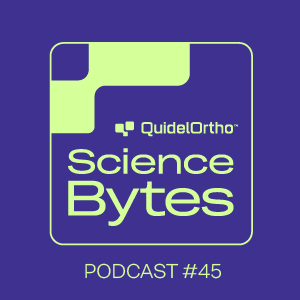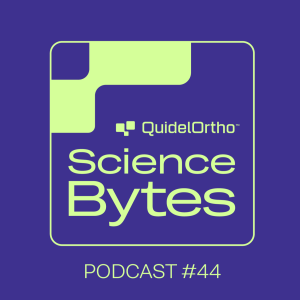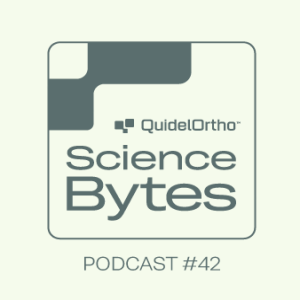
31.7K
Downloads
55
Episodes
Today’s healthcare marketplace is more complex than ever. Labs today are faced with increasing regulatory and quality demands coupled with a shortage of skilled labor. QuidelOrtho is committed to helping labs meet these challenges head-on. Join us every month as we discuss the complex questions labs are facing every day.
Episodes

Wednesday Mar 19, 2025
Under attack: Sepsis and patient safety in the age of antibiotic resistance
Wednesday Mar 19, 2025
Wednesday Mar 19, 2025
This episode discusses the growing threat of sepsis, a life-threatening condition caused by the body's overwhelming response to an infection. It explores the connection between the rise in sepsis cases and the increasing problem of antibiotic resistance, highlighting the importance of effective diagnostic tools and antibiotic stewardship programs in combating this public health challenge.
About Our Speaker:
Dr. Mike Broyles
With more than 30 years of experience as a hospital pharmacy and laboratory director, Dr. Broyles is a leading expert on sepsis and the clinical use of drugs with a focus on antimicrobial stewardship. Prior to joining Thermo Fisher Scientific, Dr. Broyles was a consultant for over 25 years working with a large independent hospital network as pharmacy advisor chairman focused on developing and implementing hospital-wide clinical initiatives. Dr. Broyles has worked passionately throughout his career to define effective protocols and decision support processes in patient management and the use of diagnostic technology to help clinicians improve outcomes through better clinical care.

Wednesday Feb 19, 2025
Take heart: How Point-of-Care Cardiac Diagnostics Save Time and Lives
Wednesday Feb 19, 2025
Wednesday Feb 19, 2025
In this episode, we’ll discuss the importance of cardiac testing at the point of care with two renowned experts on the topic, doctors Martin Than and Paul Collinson. Both of our guests today have extensive experience on the front lines of patient care and have witnessed firsthand how point-of-care testing can save time and save lives.
About our speakers:
Doctor Martin Than currently holds several positions in the field, including consultant specialists and director of research for the emergency department at Christchurch Hospital in New Zealand. He has authored 187 peer-reviewed journal articles on emergency medicine, cardiac care and diagnostics. Doctor Than is recognized worldwide for his research on the rapid diagnosis of acute coronary syndrome.
Doctor Paul Collinson is presently a professor of cardiovascular biomarkers and consultant cardiologist at City Saint George's Medical School in London. Doctor Collinson has held clinical staff and university faculty positions in orthopedics, general family medicine, cardiology and pathology. He has published over 300 papers and review articles, 281 abstracts and 15 book chapters. Doctor Collinson has also been recognized numerous times for his research by the American Association of Clinical Chemists, including the Outstanding Research Award in point-of-care testing, as well as the high test award, now the IFCC Award for Lifetime Achievement and Cardiovascular biomarkers.

Wednesday Jan 29, 2025
Value of Metrics in the Laboratory Environment
Wednesday Jan 29, 2025
Wednesday Jan 29, 2025
In this episode, we’ll explore how quality performance metrics are transforming clinical laboratory operations and why measuring the details – from accuracy to turnaround times – are essential for improving everything from test results to patient care.
About Our Speaker:
Johanna Miller, Global Product Manager for QuidelOrtho. Johanna brings a wealth of expertise working with laboratory metrics. She also has a strong background in data science, and she recently published a peer-reviewed article on a novel approach to leveraging big data to calculate Sigma metrics using input from real-world clinical laboratories. Johanna has also worked closely with lab teams to build the discipline to provide metrics they can use to improve their performance. She's passionate about helping lab staff achieve excellence through data and innovation, and today she'll share her insights on how metrics can help teams navigate challenges, prioritize improvements and ultimately deliver the best possible patient outcomes.

Wednesday Jan 29, 2025
Preventing Rh Disease, the evolution from discovery to ongoing challenges
Wednesday Jan 29, 2025
Wednesday Jan 29, 2025
Rh disease remains a significant health challenge, particularly impacting expectant mothers and their newborns. In this episode of Science Bytes, Dr. Steven Spitalnik discusses the milestones in Rh disease treatment, the ongoing challenges and future opportunities to combat this condition.
About our Speaker
Dr Spitalnik, MD is a Professor in the Department of Pathology and Cell Biology, Vagelos College of Physicians and Surgeons of Columbia University, and a member of the Medical Staff at New York Presbyterian/Columbia. He has authored over 250 publications and served as an investigator on ~30 grants and contracts including Principal investigator on ~20 of those grants. Additionally, he has sponsored more than 15 Training Grants. Dr. Spitalnik is a member of multiple professional societies, including the Association for the Advancement of Blood and Biotherapies (AABB) and the International Society for Blood Transfusion (ISBT). He has served on multiple committees within these organizations and was on the Board of Directors for the AABB. He has received multiple society awards and was elected to the Hall of Fame of the AABB Foundation (previously the National Blood Foundation). Dr. Spitalnik is the Founding Member and Executive Director of the Worldwide Initiative for Rh Disease Eradication (WIRhE).

Wednesday Oct 23, 2024
Spotlight on syphilis: Breaking the chain with early detection
Wednesday Oct 23, 2024
Wednesday Oct 23, 2024
The syphilis epidemic in the U.S. is a growing public health crisis, with rates increasing by 76% from 2018 to 2022. Syphilis is preventable and curable, but early detection is key—especially for pregnant women, where timely testing can prevent congenital syphilis.
Don’t miss this episode on the solutions to this growing epidemic.
About Our Speaker:
Dr. Lily Li is the Senior Director of Medical, Scientific & Clinical Affairs at QuidelOrtho. With a medical degree from Peking University and a PhD in Immunology from the University of Alberta, Dr. Li has guided the development of multiple infectious disease diagnostic tests at QuidelOrtho.

Wednesday Sep 25, 2024
She's not 'just tired': Exposing the hidden thyroid epidemic in women
Wednesday Sep 25, 2024
Wednesday Sep 25, 2024
Did you know that women are 10 times more likely than men to develop a thyroid condition, yet often remain undiagnosed due to medical bias and lack of awareness? We often see women present themselves to an emergency department with health concerns that are brushed off as “stress” or “weight-related” versus conducting diagnostic testing to identify the root cause.
How can we address that?
Don’t miss this episode on how healthcare providers can address these types of biases including timeliness of diagnosis, screening practices, and interpretation of lab results to enhance the quality of care for women with thyroid conditions.
About our speaker
Jeff Houtz, Senior Global Product Manager
Jeff Houtz is the Senior Global Product Manager for QuidelOrtho covering thyroid and reproductive endocrine products. Jeff has 35 years of experience in research and development, product development, and medical education in a variety of disease states including reproductive and thyroid disorders. Providing accurate and meaningful diagnoses in furtherance of improved healthcare has always been a driver and motivator. Jeff has been instrumental in creating numerous CME and P.A.C.E.-accredited content for physicians, nurses, and laboratorians in the U.S. and Europe.
In addition to assay development Jeff is passionate about patient advocacy which is why he has worked closely with the Graves’ Disease and Thyroid Foundation and Thyroid Federation International. Jeff has also collaborated with LifeTime TV in support of programs on The Balancing Act and Access Health surrounding thyroid disease.
Jeff is also a family man married for 30 years with 2 wonderful kids.

Tuesday Nov 21, 2023
Identifying Lesion-Causing Viral Pathogens
Tuesday Nov 21, 2023
Tuesday Nov 21, 2023
The World Health Organization estimates 3.7 billion people under age 50 (67%) globally have herpes simplex virus type 1 (HSV-1) infection, the main cause of oral herpes, and 491 million people aged 15–49 (13%) worldwide have a herpes simplex virus type 2 (HSV-2) infection, the main cause of genital herpes. Although treatable, most HSV infections are often asymptomatic or unrecognized. Moreover, management of HSV infections is complicated by overlapping clinical presentation of unrelated herpesvirus infections, such as varicella-zoster virus (VZV), requiring differential diagnosis. Innovations in molecular diagnostics continue to play a critical role in the diagnosis and management of these diseases.
About Our Speaker:
Lori Henderson earned a bachelor’s degree in biology from Bucknell University. She began her career in the laboratory working on drug discovery and then transitioned into commercial roles within the biopharma and diagnostics sectors of the life science industry. Lori has direct experience in multiple disease and therapeutic areas and currently focuses on sexually transmitted diseases and women’s health. Within the molecular business unit at QuidelOrtho, Lori is responsible for identifying and helping drive the development of products to meet clinical and patient needs.

Thursday Sep 21, 2023
Hyperhemolysis Syndrome in the Patient With Sickle Cell Disease
Thursday Sep 21, 2023
Thursday Sep 21, 2023
Sickle cell disease (SCD) patients are at risk of developing multiple complications from transfusions, including alloimmunization to red blood cell antigens, delayed hemolytic transfusion reactions and hyperhemolysis syndrome (HHS). While HHS is a rare complication of repeat blood transfusions in patients with SCD, clinicians and the laboratory have important roles in its detection and management.
In this podcast, Wally R. Smith, MD, the inaugural Florence Neal Cooper Smith Professor of Sickle Cell Disease at Virginia Commonwealth University shares insights to screening for and managing HHS.
About Our Speaker:
Wally R. Smith, MD, is an experienced implementation scientist and expert in clinical and health services research in sickle cell disease (SCD). He serves as Vice Chair for Research of the Division of General Internal Medicine at Virginia Commonwealth University (VCU) and was Scientific Director of the Center on Health Disparities at VCU. Dr. Smith has authored over 100 publications and served as an investigator on over 50 grants and contracts. He has been principal investigator on 26 federal or foundation-funded grants and contracts including: Pain in Sickle Cell Epidemiology Study (PiSCES), the largest and most detailed adult cohort that changed our understanding of SCD pain in adults and, since 2012, Start Healing in Patients with Hydroxyurea, the first-ever randomized controlled trial of implementation science in SCD.

Wednesday Aug 30, 2023
Sigma Metrics and the Value of Real World Evidence
Wednesday Aug 30, 2023
Wednesday Aug 30, 2023
Six Sigma is a popular way to measure quality. Sigma metrics have been adapted for the clinical laboratory by incorporating observed accuracy, precision and total error allowed (TEa). In vitro diagnostic (IVD) manufacturers have used Six Sigma to assess the quality of their assays using a small number of well-controlled systems to generate the data. QuidelOrtho has developed a novel approach to assess laboratory Sigma metrics for a broad range of assays using data from over 1,300 Vitros® instruments used in clinical labs.
In this podcast, Johanna Miller, data scientist at QuidelOrtho, discusses the value of using real-world data to perform Sigma metric studies and how a lab can use this information.
About Our Speaker:
Johanna Miller holds a bachelor's degree in biomedical engineering from the University of Rochester and a master's in product development and data science from the Rochester Institute of Technology. She spent 10 years developing expertise on Vitros systems and the data it generates, while working in product development. Currently, she focuses on developing new and interesting methods to use data at QuidelOrtho - specifically to bring insights directly to labs using Six Sigma quality scores.

Tuesday Jun 20, 2023
A Comprehensive Discussion of Reference Intervals
Tuesday Jun 20, 2023
Tuesday Jun 20, 2023
Reference intervals (RIs) are a fundamental decision support tool used by clinicians and lab professionals to interpret laboratory reports and assess an individual’s health status. The establishment of reference intervals, however, can be challenging due to many physiological factors that influence their values and heterogeneities that inherently exist in populations.
In this podcast, Dr. Lindy Crimmins will provide a comprehensive explanation of the influencing factors and evolving methodology of RIs from how they are established to how they are advancing.
About Our Speaker:
Dr. Lindy Crimmins is a Manager of Medical Affairs at QuidelOrtho. She holds a Bachelor’s degree in Chemistry from the University of Wisconsin-Madison and a Medical Degree from the University of Illinois. Her clinical experience spanned from Emergency Medicine to critical care to primary care. Her time in the industry focused on clinical chemistry and point-of-care technical support prior to Medical and Scientific Affairs. Currently, she is responsible for providing medical support for QuidelOrtho’s acute care menu throughout the product lifecycle.
